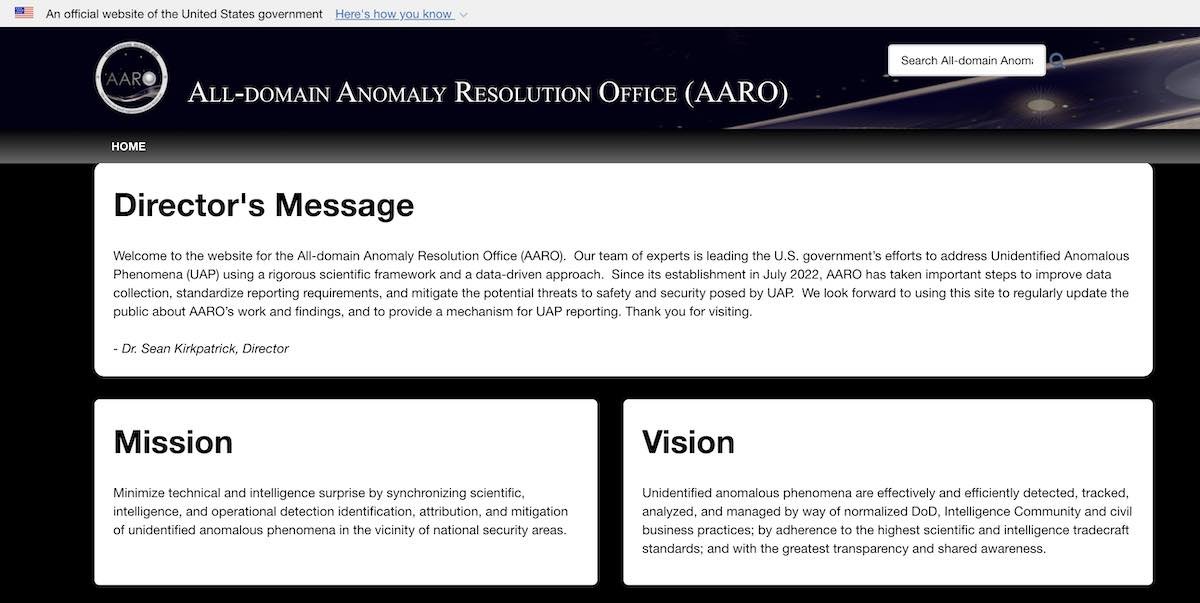The All-domain Anomaly Resolution Office (AARO), the office that oversees the Pentagon’s investigations into unidentified anomalous phenomena (UAP), has finally launched its official website.
The new website, which appeared online early on Thursday, currently features a sparse selection of general information about AARO, its mission, and its activities related to the collection of information about UAP.
“Our team of experts is leading the U.S. government’s efforts to address Unidentified Anomalous Phenomena (UAP) using a rigorous scientific framework and a data-driven approach,” read a portion of a statement by Sean Kirkpatrick, the current director of AARO, featured on the new website.
“Since its establishment in July 2022, AARO has taken important steps to improve data collection, standardize reporting requirements, and mitigate the potential threats to safety and security posed by UAP.”


Prior to the launch of the new website on Thursday, it was reported that U.S. Deputy Secretary of Defense Kathleen Hicks had taken a more active role in the Pentagon’s UAP investigations in recent days, following a series of Congressional hearings that addressed UAP incidents and AARO’s progress in analyzing and resolving information it has collected since it was established.
Writing for Defense Scoop, reporter Brandi Vincent wrote that Hicks recently said in a series of conversations that the Pentagon needs to be able to understand and resolve what UAPs are, as well as why and how they “exhibit behaviors not readily understood by our sensors or observers to ensure they are not a threat to our homeland.”
Hicks has reportedly participated in weekly briefings with Kirkpatrick and other officials involved in AARO’s operations both to hasten the development of the new website, as well as to establish a formal reporting mechanism that will collect reports involving UAP encounters.
Although the long-awaited AARO website has finally launched, one thing that is currently missing is the formal reporting system AARO has been directed by Congress to establish.
In 2022, language that was eventually included in the FY 2023 National Defense Authorization Act (NDAA) mandated the establishment of an official system for reporting UAP-related information, regardless of classification level, to the Office that later officially became AARO.
The bill also contained language calling for the protection of witnesses who approached AARO with information related to UAP and any government programs related to it, as well as release from stipulations in nondisclosure orders and written agreements that may prohibit the release of such information to AARO.
Elements of AARO’s forthcoming reporting system, which have reportedly already been developed, are still undergoing security review to ensure the secure transmission of any UAP information sent to AARO, along with protecting the identities of government personnel who provide it.
“The department is conducting its final reviews to ensure the reporting mechanism complies with the Privacy Act of 1974, the Whistleblower Protections Enhancement Act of 2012, the Federal Employee Antidiscrimination and Retaliation Act of 2002 (No FEAR Act), and the Paperwork Reduction Act of 1995,” a Pentagon release issued on Thursday afternoon stated.
“In the interim, current U.S. service members, U.S. government employees, and civil aviators are encouraged to continue to use the existing reporting mechanisms available to them through their organizations.”
The reporting system will likely be launched sometime in late October, at which time it will begin operation by initially collecting UAP information only from U.S. government personnel.
“AARO will be accepting reports from current or former U.S. Government employees, service members, or contractors with direct knowledge of U.S. Government programs or activities related to UAP dating back to 1945,” reads a statement currently featured on the new AARO website.
“These reports will be used to inform AARO’s congressionally directed Historical Record Report,” the statement adds. “We will announce when a reporting mechanism is available for others to use.”
According to the new website, AARO has the unrestricted ability to receive “all UAP-related information, including any classified national security information involving military, intelligence, and intelligence-related activities, at all levels of classification regardless of any restrictive access controls, special access programs, or compartmented access programs.”
A statement on the new site adds that there are currently no restrictions preventing AARO from receiving any UAP information, past or present, “regardless of the organizational affiliation of the original classification authority within DoD, the Intelligence Community, or any other U.S. government department or agency.”
At a future date, a “mechanism for members of the general public to make reports” is also expected to be added to the site, Thursday’s Pentagon news release stated.
Although classified information currently cannot be accepted by AARO through its new website, such information may be provided to AARO personnel directly within secure facilities for the time being.
Some limited data and other details related to AARO’s findings that have already been publicly available for some time have been included on the new website, and in the months ahead, AARO says it will use the site to share additional unrestricted information with the public.
“We look forward to using this site to regularly update the public about AARO’s work and findings,” Kirkpatrick’s message on the new website reads, “and to provide a mechanism for UAP reporting.”
This article has been updated to include additional statements issued by the Pentagon after the time of its original publication.
Micah Hanks is the Editor-in-Chief and Co-Founder of The Debrief. He can be reached by email at micah@thedebrief.org. Follow his work at micahhanks.com and on Twitter: @MicahHanks.

